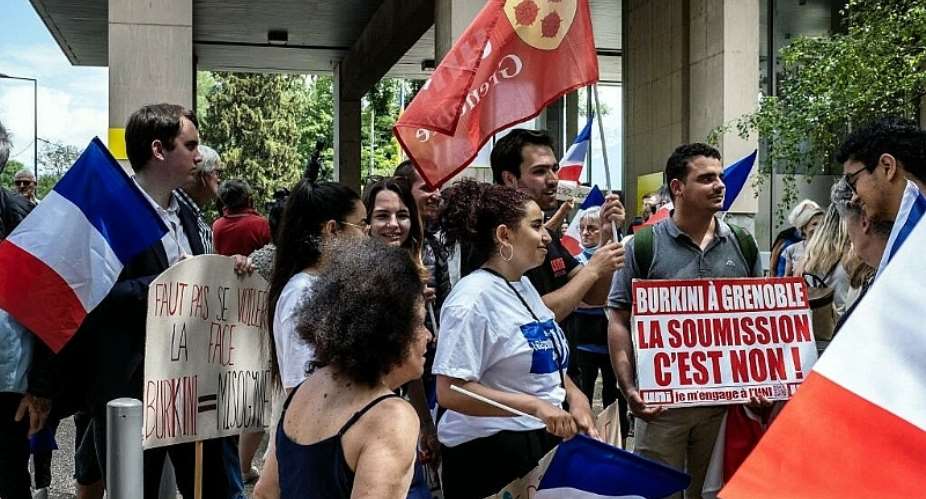Grenoble has become France's second city to allow burkinis to be worn by women in public swimming pools – as well as topless bathing – following a divisive city council vote Monday on modifying swimwear rules.
Hundreds of protesters from opposition groups staged rallies in front of the alpine city's town hall demanding a referendum on the issue, which they say calls into question the values of the French republic.
The swimsuit, worn by some Muslim women to cover their bodies and hair while bathing, is banned in most state-run pools for hygiene reasons – as are beach shorts.
Grenoble's ecologist Mayor, Éric Piolle, said he wanted to ensure equal access to public services, and to allow people the freedom to “dress or undress”, while respecting hygiene and safety. Piolle earlier reopened debate on the wearing of the burkini in an open letter to Emmanuel Macron published in the local Dauphiné Libéré newspaper.
"Our desire is to remove the abnormal clothing bans: this concerns bare breasts as well as full-body swimming costumes worn to protect oneself from the sun or for reasons of conviction,” Piolle said.
“The question is not specifically whether we are for or against the burkini.”
While France's Council of State authorised burkinis on beaches in 2016 – following attempts by several mayors in the south of France to ban the swimsuit on Mediterranean beaches – rules in public swimming pools are subject to local regulations.
To date, Rennes is the only French city to allow burkinis to be worn.
Stiff opposition
Opposition to Grenoble's decision is rife, with elected officials from across the Isère department, where the city is located, denouncing the burkini as a sign of “oppression and inferiority for women".
In a statement, Isère authorities said the move to allow burkinis – which “gave in to religiously motivated community demands" – would be challenged in the city's administrative court under France's separatism laws.
Meanwhile, the president of the wider Auvergne-Rhône-Alpes region warned the city of Grenoble would lose all of its subsidies. “Not one cent … will finance your submission to Islamism," Laurent Wauquiez said.
Thirty-eight mayors from the Grenoble region hailing from across the political spectrum have voiced their opposition to the burkini decision – including former right-wing mayor Alain Carignon, who has urged the people to "demand a referendum".
- French Equality Minister backs the right for women to play football in veils
- French debate on 'secular values' opens in a climate of political hostility
However Pierre Juston, a lawyer specialising in secular issues, told weekly news magazine Marianne that neither France's secularism laws dating back to 1905, nor a 2021 law reinforcing respect for the “principles of the Republic" could be used to overturn Grenoble's decision.
“One can be against the burkini from a political and philosophical point of view … but this consideration is entirely moral,” Juston said. “The 1905 law on the separation of church and state, like the 2021 law upholding the principles of the Republic, does not come into play.”
While the first law would prevent a pool employee from wearing a burkini, it would not apply to members of the public, he said. For the 2021 law to apply, opponents would need to prove that Piolle's decision was the work of “dangerous fundamentalist associations”.





 E-Cedi will be used as a weapon to fight money laundering and corruption — Bawum...
E-Cedi will be used as a weapon to fight money laundering and corruption — Bawum...
 Election 20204: Transfer power to us peacefully for your own good — NDC tells NP...
Election 20204: Transfer power to us peacefully for your own good — NDC tells NP...
 Voter registration: Don't bus minors to registration centres — Nana Akomea warn ...
Voter registration: Don't bus minors to registration centres — Nana Akomea warn ...
 Error in registration slip: Trust the Commission on its mandate — EC assure Ghan...
Error in registration slip: Trust the Commission on its mandate — EC assure Ghan...
 Ejisu by-election: NPP aspirant who projected less than 5% votes for Aduomi cong...
Ejisu by-election: NPP aspirant who projected less than 5% votes for Aduomi cong...
 Election 2024: Stolen BVR kits could be used to illegally register people – NDC ...
Election 2024: Stolen BVR kits could be used to illegally register people – NDC ...
 60% of SHSs taken off double track system – Dr Yaw Osei Adutwum
60% of SHSs taken off double track system – Dr Yaw Osei Adutwum
 Voter registration: We hope to hit over one million registered voters in Volta -...
Voter registration: We hope to hit over one million registered voters in Volta -...
 Akufo-Addo not obliged to disclose full KPMG audit report – Presidency
Akufo-Addo not obliged to disclose full KPMG audit report – Presidency
 ECG staff used ransomware to sabotage paperless system, can you imagine they eve...
ECG staff used ransomware to sabotage paperless system, can you imagine they eve...
